Psychology: Perspectives, Research Methods, and Ethical Considerations
VerifiedAdded on 2023/05/30
|9
|2512
|304
Essay
AI Summary
This assignment provides an assessment of psychology, covering different perspectives and related concepts. It includes an essay explaining various perspectives in psychology, focusing on the psychodynamic approach, and a section on the scientific approach and ethical issues. The essay highlights seven major perspectives in modern psychology, including biological, cognitive, behavioral, psychodynamic, humanistic, evolutionary, and cross-cultural perspectives. It delves into the psychodynamic theory by Sigmund Freud, emphasizing the influence of childhood events on adult behavior. The assignment also examines the need for a scientific approach in psychology, differentiating between anecdotal and scientific evidence, and discusses the suitability of different research methods for studying anxiety disorders. Furthermore, it addresses ethical issues in psychological case studies, such as protection from harm, right to withdraw, confidentiality, informed consent, debriefing, and deception, referencing relevant studies and guidelines.
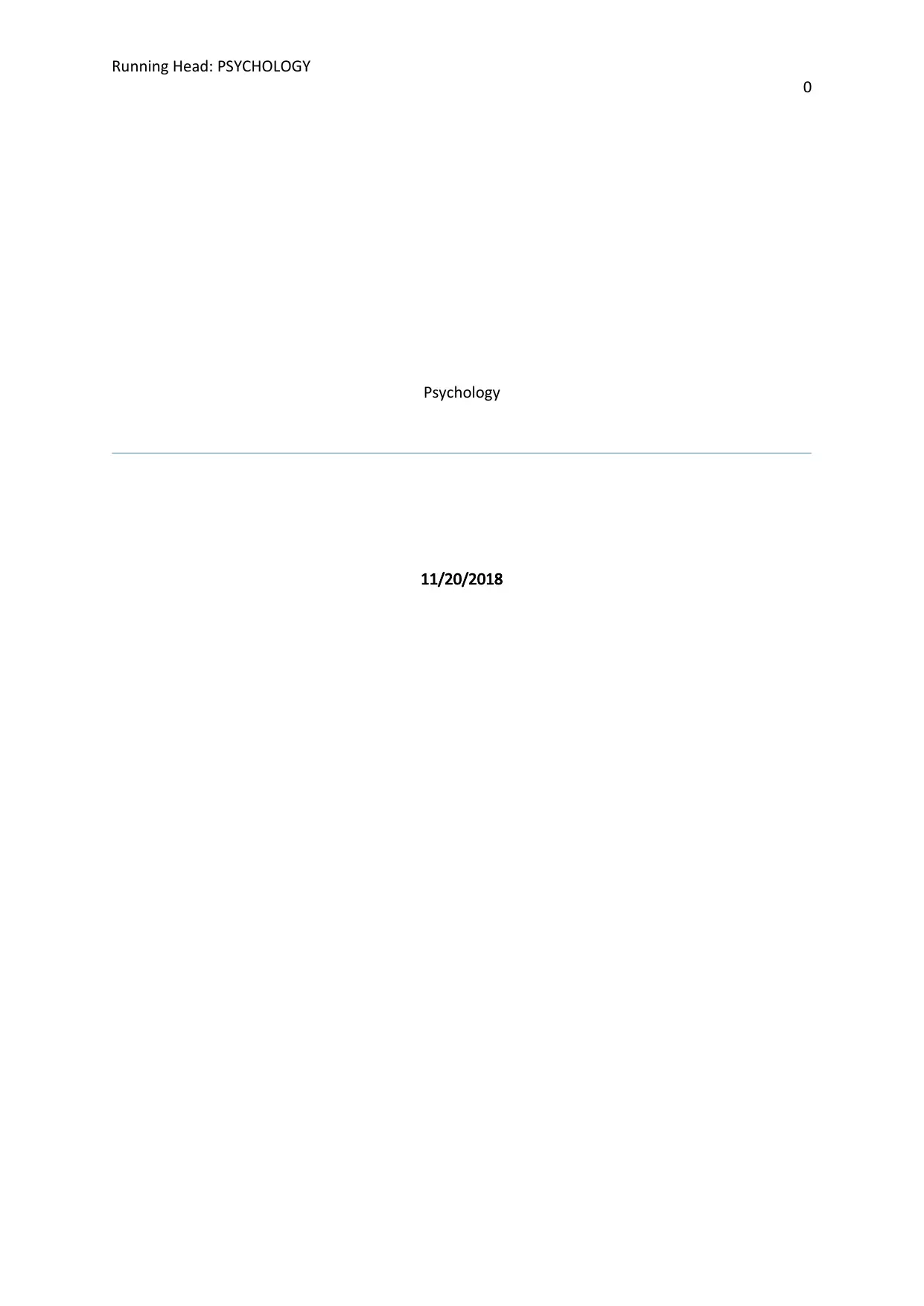
Running Head: PSYCHOLOGY
0
Psychology
11/20/2018
0
Psychology
11/20/2018
Paraphrase This Document
Need a fresh take? Get an instant paraphrase of this document with our AI Paraphraser
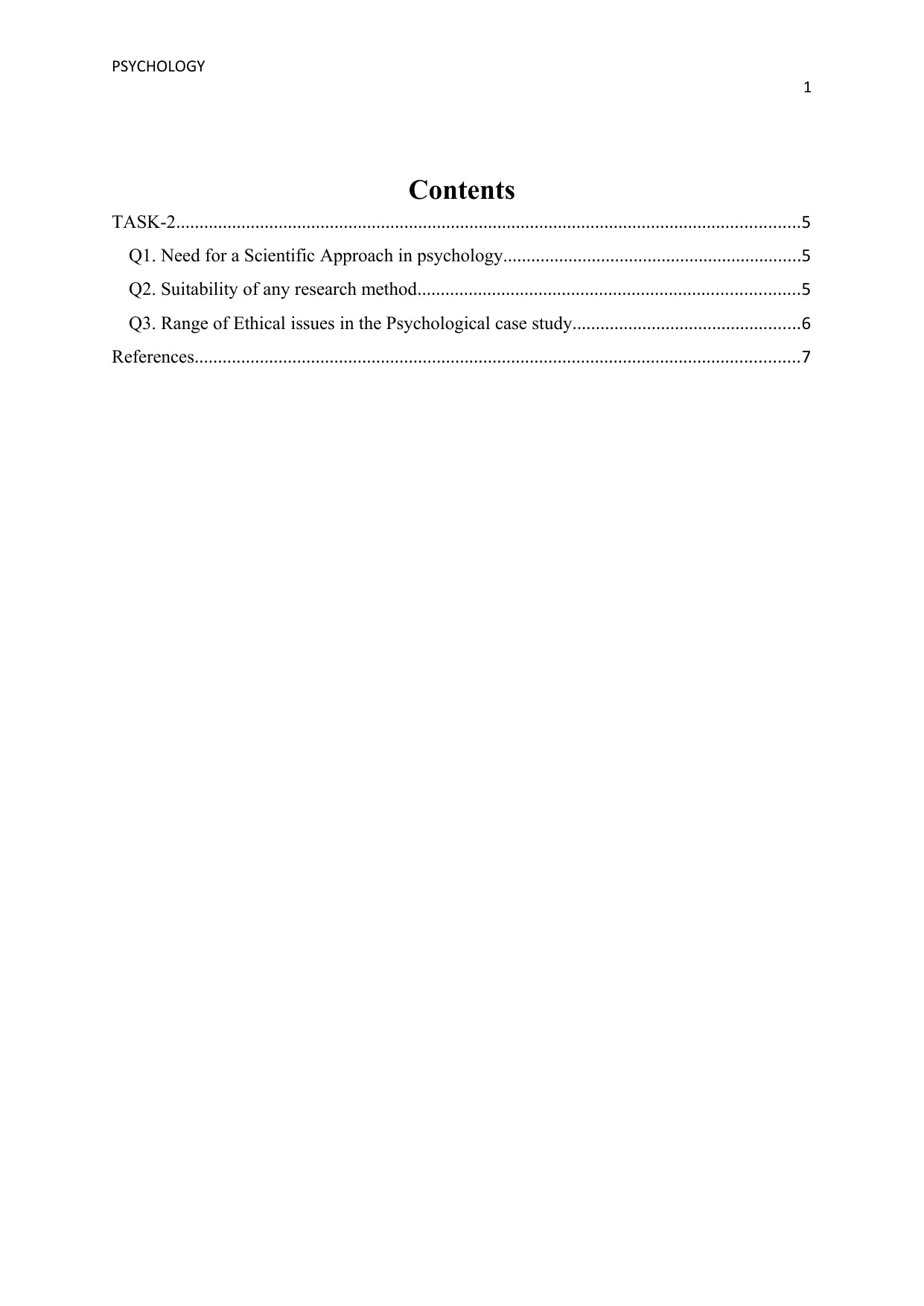
PSYCHOLOGY
1
Contents
TASK-2......................................................................................................................................5
Q1. Need for a Scientific Approach in psychology................................................................5
Q2. Suitability of any research method..................................................................................5
Q3. Range of Ethical issues in the Psychological case study.................................................6
References..................................................................................................................................7
1
Contents
TASK-2......................................................................................................................................5
Q1. Need for a Scientific Approach in psychology................................................................5
Q2. Suitability of any research method..................................................................................5
Q3. Range of Ethical issues in the Psychological case study.................................................6
References..................................................................................................................................7
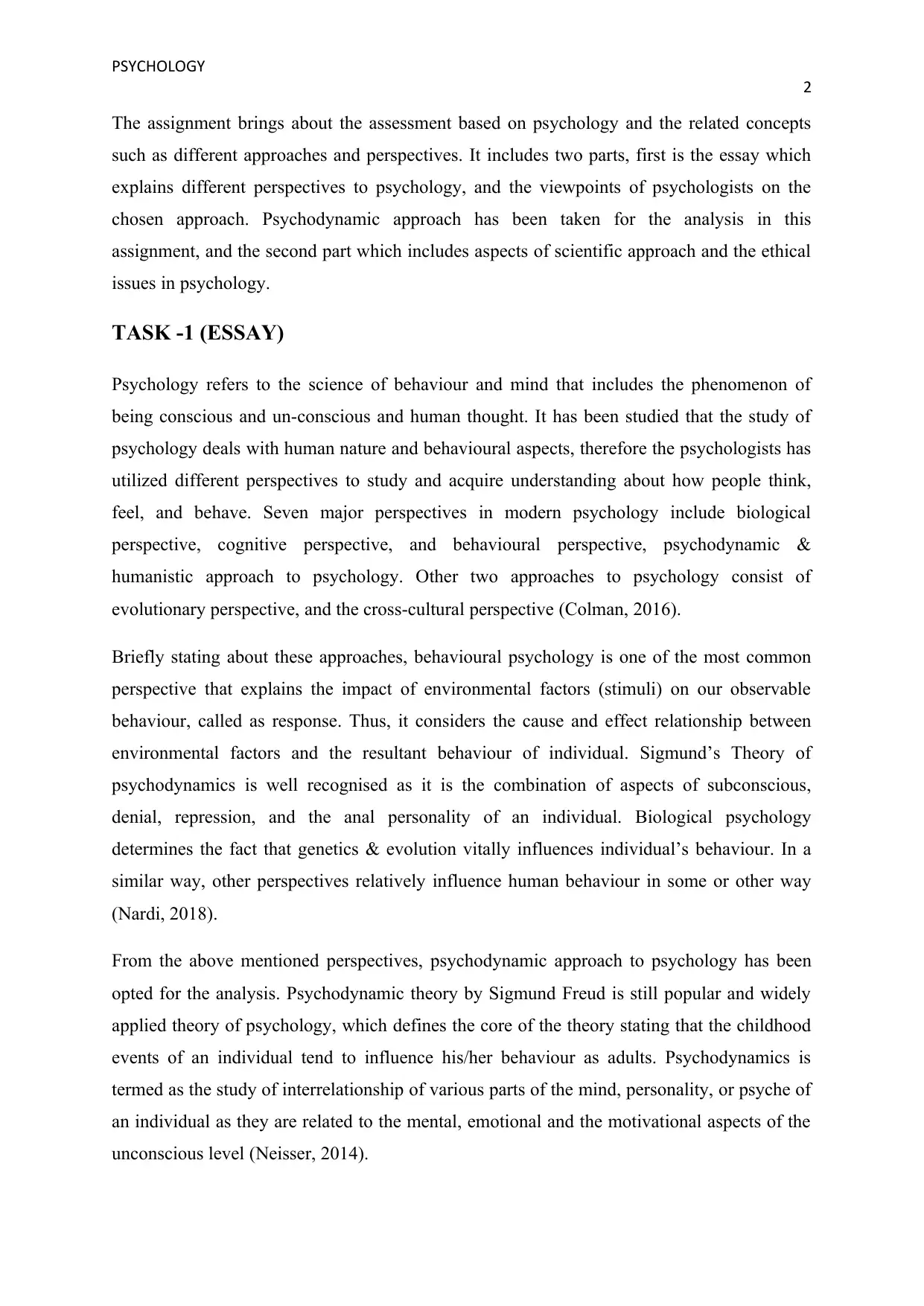
PSYCHOLOGY
2
The assignment brings about the assessment based on psychology and the related concepts
such as different approaches and perspectives. It includes two parts, first is the essay which
explains different perspectives to psychology, and the viewpoints of psychologists on the
chosen approach. Psychodynamic approach has been taken for the analysis in this
assignment, and the second part which includes aspects of scientific approach and the ethical
issues in psychology.
TASK -1 (ESSAY)
Psychology refers to the science of behaviour and mind that includes the phenomenon of
being conscious and un-conscious and human thought. It has been studied that the study of
psychology deals with human nature and behavioural aspects, therefore the psychologists has
utilized different perspectives to study and acquire understanding about how people think,
feel, and behave. Seven major perspectives in modern psychology include biological
perspective, cognitive perspective, and behavioural perspective, psychodynamic &
humanistic approach to psychology. Other two approaches to psychology consist of
evolutionary perspective, and the cross-cultural perspective (Colman, 2016).
Briefly stating about these approaches, behavioural psychology is one of the most common
perspective that explains the impact of environmental factors (stimuli) on our observable
behaviour, called as response. Thus, it considers the cause and effect relationship between
environmental factors and the resultant behaviour of individual. Sigmund’s Theory of
psychodynamics is well recognised as it is the combination of aspects of subconscious,
denial, repression, and the anal personality of an individual. Biological psychology
determines the fact that genetics & evolution vitally influences individual’s behaviour. In a
similar way, other perspectives relatively influence human behaviour in some or other way
(Nardi, 2018).
From the above mentioned perspectives, psychodynamic approach to psychology has been
opted for the analysis. Psychodynamic theory by Sigmund Freud is still popular and widely
applied theory of psychology, which defines the core of the theory stating that the childhood
events of an individual tend to influence his/her behaviour as adults. Psychodynamics is
termed as the study of interrelationship of various parts of the mind, personality, or psyche of
an individual as they are related to the mental, emotional and the motivational aspects of the
unconscious level (Neisser, 2014).
2
The assignment brings about the assessment based on psychology and the related concepts
such as different approaches and perspectives. It includes two parts, first is the essay which
explains different perspectives to psychology, and the viewpoints of psychologists on the
chosen approach. Psychodynamic approach has been taken for the analysis in this
assignment, and the second part which includes aspects of scientific approach and the ethical
issues in psychology.
TASK -1 (ESSAY)
Psychology refers to the science of behaviour and mind that includes the phenomenon of
being conscious and un-conscious and human thought. It has been studied that the study of
psychology deals with human nature and behavioural aspects, therefore the psychologists has
utilized different perspectives to study and acquire understanding about how people think,
feel, and behave. Seven major perspectives in modern psychology include biological
perspective, cognitive perspective, and behavioural perspective, psychodynamic &
humanistic approach to psychology. Other two approaches to psychology consist of
evolutionary perspective, and the cross-cultural perspective (Colman, 2016).
Briefly stating about these approaches, behavioural psychology is one of the most common
perspective that explains the impact of environmental factors (stimuli) on our observable
behaviour, called as response. Thus, it considers the cause and effect relationship between
environmental factors and the resultant behaviour of individual. Sigmund’s Theory of
psychodynamics is well recognised as it is the combination of aspects of subconscious,
denial, repression, and the anal personality of an individual. Biological psychology
determines the fact that genetics & evolution vitally influences individual’s behaviour. In a
similar way, other perspectives relatively influence human behaviour in some or other way
(Nardi, 2018).
From the above mentioned perspectives, psychodynamic approach to psychology has been
opted for the analysis. Psychodynamic theory by Sigmund Freud is still popular and widely
applied theory of psychology, which defines the core of the theory stating that the childhood
events of an individual tend to influence his/her behaviour as adults. Psychodynamics is
termed as the study of interrelationship of various parts of the mind, personality, or psyche of
an individual as they are related to the mental, emotional and the motivational aspects of the
unconscious level (Neisser, 2014).
⊘ This is a preview!⊘
Do you want full access?
Subscribe today to unlock all pages.

Trusted by 1+ million students worldwide
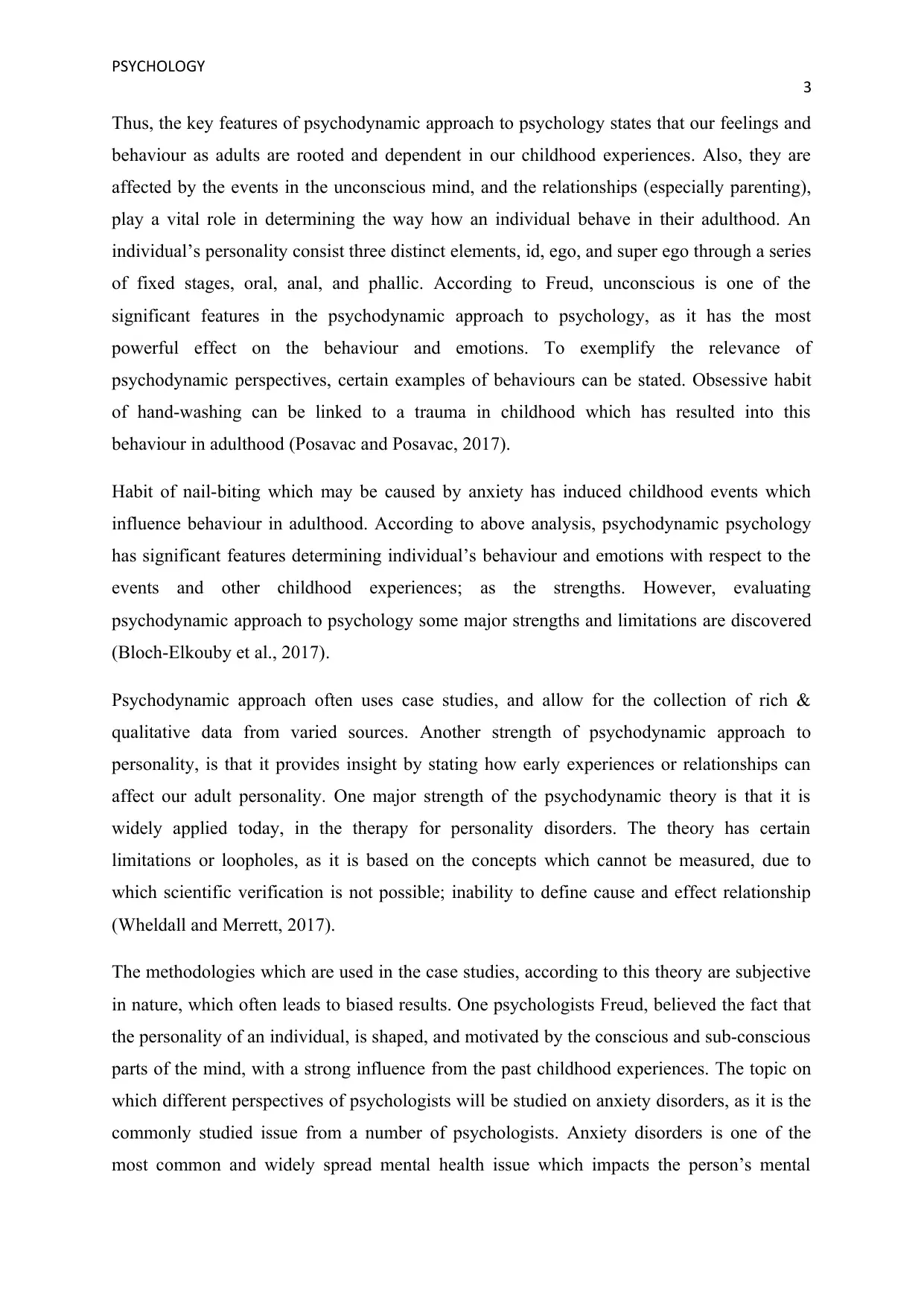
PSYCHOLOGY
3
Thus, the key features of psychodynamic approach to psychology states that our feelings and
behaviour as adults are rooted and dependent in our childhood experiences. Also, they are
affected by the events in the unconscious mind, and the relationships (especially parenting),
play a vital role in determining the way how an individual behave in their adulthood. An
individual’s personality consist three distinct elements, id, ego, and super ego through a series
of fixed stages, oral, anal, and phallic. According to Freud, unconscious is one of the
significant features in the psychodynamic approach to psychology, as it has the most
powerful effect on the behaviour and emotions. To exemplify the relevance of
psychodynamic perspectives, certain examples of behaviours can be stated. Obsessive habit
of hand-washing can be linked to a trauma in childhood which has resulted into this
behaviour in adulthood (Posavac and Posavac, 2017).
Habit of nail-biting which may be caused by anxiety has induced childhood events which
influence behaviour in adulthood. According to above analysis, psychodynamic psychology
has significant features determining individual’s behaviour and emotions with respect to the
events and other childhood experiences; as the strengths. However, evaluating
psychodynamic approach to psychology some major strengths and limitations are discovered
(Bloch-Elkouby et al., 2017).
Psychodynamic approach often uses case studies, and allow for the collection of rich &
qualitative data from varied sources. Another strength of psychodynamic approach to
personality, is that it provides insight by stating how early experiences or relationships can
affect our adult personality. One major strength of the psychodynamic theory is that it is
widely applied today, in the therapy for personality disorders. The theory has certain
limitations or loopholes, as it is based on the concepts which cannot be measured, due to
which scientific verification is not possible; inability to define cause and effect relationship
(Wheldall and Merrett, 2017).
The methodologies which are used in the case studies, according to this theory are subjective
in nature, which often leads to biased results. One psychologists Freud, believed the fact that
the personality of an individual, is shaped, and motivated by the conscious and sub-conscious
parts of the mind, with a strong influence from the past childhood experiences. The topic on
which different perspectives of psychologists will be studied on anxiety disorders, as it is the
commonly studied issue from a number of psychologists. Anxiety disorders is one of the
most common and widely spread mental health issue which impacts the person’s mental
3
Thus, the key features of psychodynamic approach to psychology states that our feelings and
behaviour as adults are rooted and dependent in our childhood experiences. Also, they are
affected by the events in the unconscious mind, and the relationships (especially parenting),
play a vital role in determining the way how an individual behave in their adulthood. An
individual’s personality consist three distinct elements, id, ego, and super ego through a series
of fixed stages, oral, anal, and phallic. According to Freud, unconscious is one of the
significant features in the psychodynamic approach to psychology, as it has the most
powerful effect on the behaviour and emotions. To exemplify the relevance of
psychodynamic perspectives, certain examples of behaviours can be stated. Obsessive habit
of hand-washing can be linked to a trauma in childhood which has resulted into this
behaviour in adulthood (Posavac and Posavac, 2017).
Habit of nail-biting which may be caused by anxiety has induced childhood events which
influence behaviour in adulthood. According to above analysis, psychodynamic psychology
has significant features determining individual’s behaviour and emotions with respect to the
events and other childhood experiences; as the strengths. However, evaluating
psychodynamic approach to psychology some major strengths and limitations are discovered
(Bloch-Elkouby et al., 2017).
Psychodynamic approach often uses case studies, and allow for the collection of rich &
qualitative data from varied sources. Another strength of psychodynamic approach to
personality, is that it provides insight by stating how early experiences or relationships can
affect our adult personality. One major strength of the psychodynamic theory is that it is
widely applied today, in the therapy for personality disorders. The theory has certain
limitations or loopholes, as it is based on the concepts which cannot be measured, due to
which scientific verification is not possible; inability to define cause and effect relationship
(Wheldall and Merrett, 2017).
The methodologies which are used in the case studies, according to this theory are subjective
in nature, which often leads to biased results. One psychologists Freud, believed the fact that
the personality of an individual, is shaped, and motivated by the conscious and sub-conscious
parts of the mind, with a strong influence from the past childhood experiences. The topic on
which different perspectives of psychologists will be studied on anxiety disorders, as it is the
commonly studied issue from a number of psychologists. Anxiety disorders is one of the
most common and widely spread mental health issue which impacts the person’s mental
Paraphrase This Document
Need a fresh take? Get an instant paraphrase of this document with our AI Paraphraser
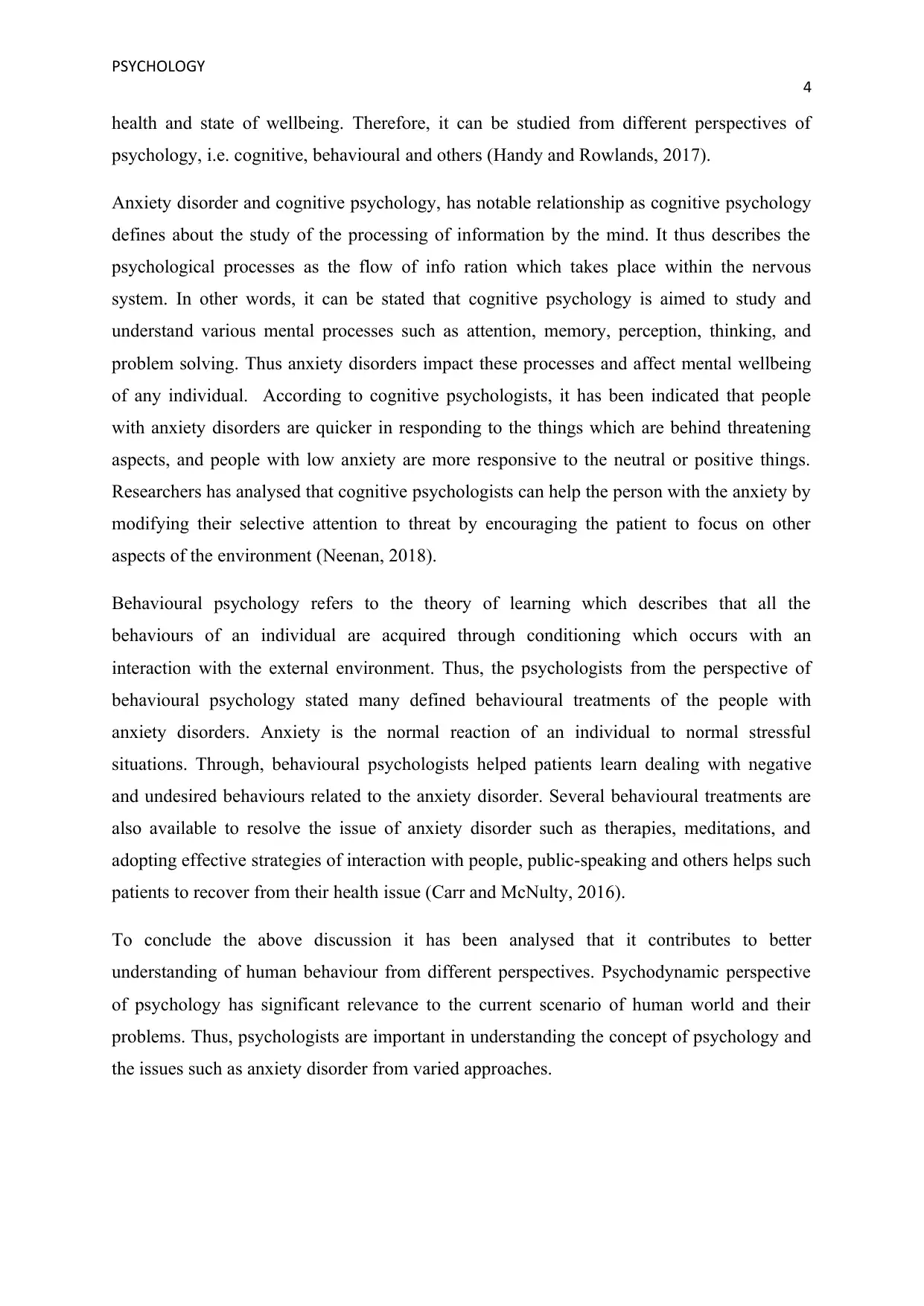
PSYCHOLOGY
4
health and state of wellbeing. Therefore, it can be studied from different perspectives of
psychology, i.e. cognitive, behavioural and others (Handy and Rowlands, 2017).
Anxiety disorder and cognitive psychology, has notable relationship as cognitive psychology
defines about the study of the processing of information by the mind. It thus describes the
psychological processes as the flow of info ration which takes place within the nervous
system. In other words, it can be stated that cognitive psychology is aimed to study and
understand various mental processes such as attention, memory, perception, thinking, and
problem solving. Thus anxiety disorders impact these processes and affect mental wellbeing
of any individual. According to cognitive psychologists, it has been indicated that people
with anxiety disorders are quicker in responding to the things which are behind threatening
aspects, and people with low anxiety are more responsive to the neutral or positive things.
Researchers has analysed that cognitive psychologists can help the person with the anxiety by
modifying their selective attention to threat by encouraging the patient to focus on other
aspects of the environment (Neenan, 2018).
Behavioural psychology refers to the theory of learning which describes that all the
behaviours of an individual are acquired through conditioning which occurs with an
interaction with the external environment. Thus, the psychologists from the perspective of
behavioural psychology stated many defined behavioural treatments of the people with
anxiety disorders. Anxiety is the normal reaction of an individual to normal stressful
situations. Through, behavioural psychologists helped patients learn dealing with negative
and undesired behaviours related to the anxiety disorder. Several behavioural treatments are
also available to resolve the issue of anxiety disorder such as therapies, meditations, and
adopting effective strategies of interaction with people, public-speaking and others helps such
patients to recover from their health issue (Carr and McNulty, 2016).
To conclude the above discussion it has been analysed that it contributes to better
understanding of human behaviour from different perspectives. Psychodynamic perspective
of psychology has significant relevance to the current scenario of human world and their
problems. Thus, psychologists are important in understanding the concept of psychology and
the issues such as anxiety disorder from varied approaches.
4
health and state of wellbeing. Therefore, it can be studied from different perspectives of
psychology, i.e. cognitive, behavioural and others (Handy and Rowlands, 2017).
Anxiety disorder and cognitive psychology, has notable relationship as cognitive psychology
defines about the study of the processing of information by the mind. It thus describes the
psychological processes as the flow of info ration which takes place within the nervous
system. In other words, it can be stated that cognitive psychology is aimed to study and
understand various mental processes such as attention, memory, perception, thinking, and
problem solving. Thus anxiety disorders impact these processes and affect mental wellbeing
of any individual. According to cognitive psychologists, it has been indicated that people
with anxiety disorders are quicker in responding to the things which are behind threatening
aspects, and people with low anxiety are more responsive to the neutral or positive things.
Researchers has analysed that cognitive psychologists can help the person with the anxiety by
modifying their selective attention to threat by encouraging the patient to focus on other
aspects of the environment (Neenan, 2018).
Behavioural psychology refers to the theory of learning which describes that all the
behaviours of an individual are acquired through conditioning which occurs with an
interaction with the external environment. Thus, the psychologists from the perspective of
behavioural psychology stated many defined behavioural treatments of the people with
anxiety disorders. Anxiety is the normal reaction of an individual to normal stressful
situations. Through, behavioural psychologists helped patients learn dealing with negative
and undesired behaviours related to the anxiety disorder. Several behavioural treatments are
also available to resolve the issue of anxiety disorder such as therapies, meditations, and
adopting effective strategies of interaction with people, public-speaking and others helps such
patients to recover from their health issue (Carr and McNulty, 2016).
To conclude the above discussion it has been analysed that it contributes to better
understanding of human behaviour from different perspectives. Psychodynamic perspective
of psychology has significant relevance to the current scenario of human world and their
problems. Thus, psychologists are important in understanding the concept of psychology and
the issues such as anxiety disorder from varied approaches.
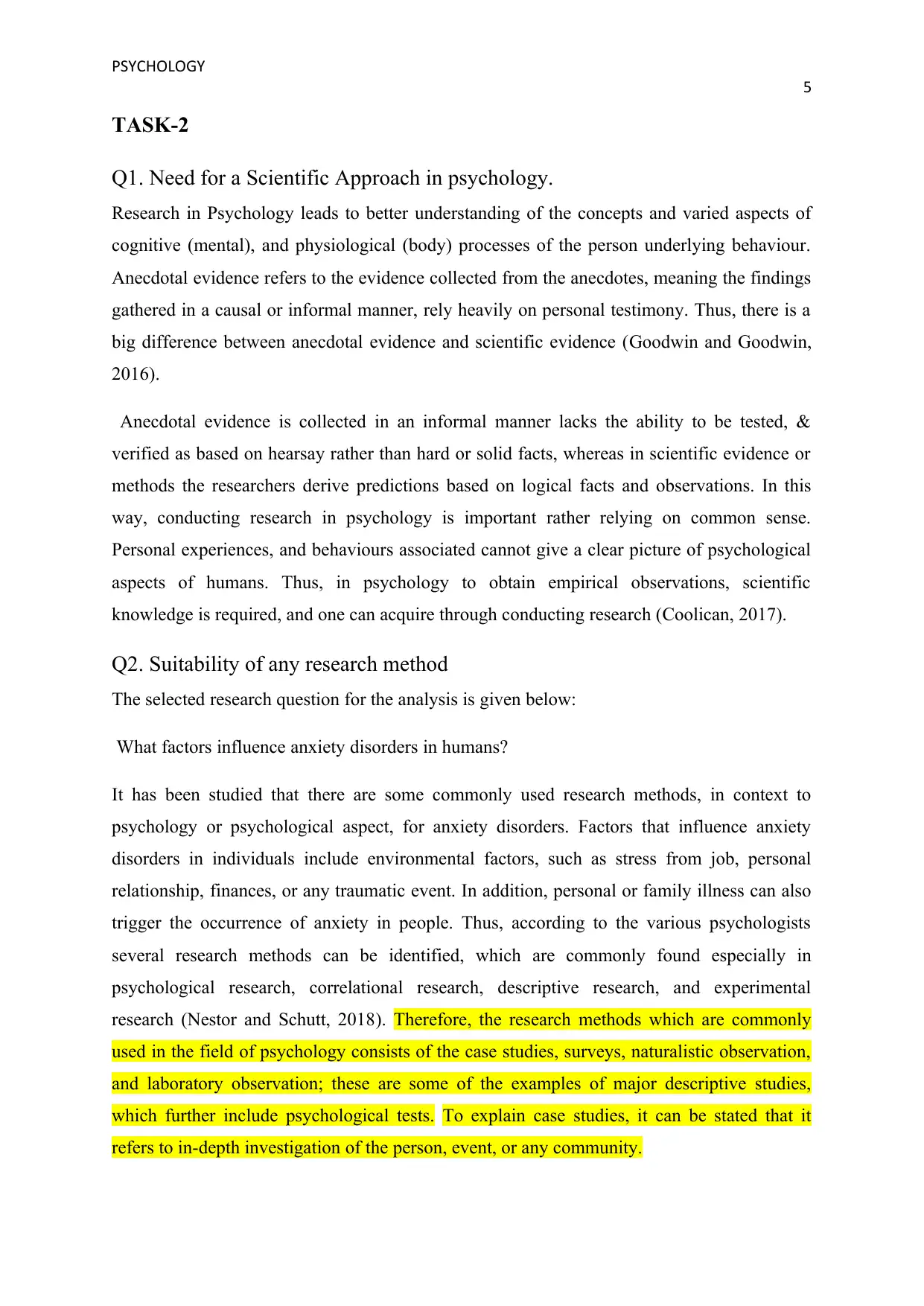
PSYCHOLOGY
5
TASK-2
Q1. Need for a Scientific Approach in psychology.
Research in Psychology leads to better understanding of the concepts and varied aspects of
cognitive (mental), and physiological (body) processes of the person underlying behaviour.
Anecdotal evidence refers to the evidence collected from the anecdotes, meaning the findings
gathered in a causal or informal manner, rely heavily on personal testimony. Thus, there is a
big difference between anecdotal evidence and scientific evidence (Goodwin and Goodwin,
2016).
Anecdotal evidence is collected in an informal manner lacks the ability to be tested, &
verified as based on hearsay rather than hard or solid facts, whereas in scientific evidence or
methods the researchers derive predictions based on logical facts and observations. In this
way, conducting research in psychology is important rather relying on common sense.
Personal experiences, and behaviours associated cannot give a clear picture of psychological
aspects of humans. Thus, in psychology to obtain empirical observations, scientific
knowledge is required, and one can acquire through conducting research (Coolican, 2017).
Q2. Suitability of any research method
The selected research question for the analysis is given below:
What factors influence anxiety disorders in humans?
It has been studied that there are some commonly used research methods, in context to
psychology or psychological aspect, for anxiety disorders. Factors that influence anxiety
disorders in individuals include environmental factors, such as stress from job, personal
relationship, finances, or any traumatic event. In addition, personal or family illness can also
trigger the occurrence of anxiety in people. Thus, according to the various psychologists
several research methods can be identified, which are commonly found especially in
psychological research, correlational research, descriptive research, and experimental
research (Nestor and Schutt, 2018). Therefore, the research methods which are commonly
used in the field of psychology consists of the case studies, surveys, naturalistic observation,
and laboratory observation; these are some of the examples of major descriptive studies,
which further include psychological tests. To explain case studies, it can be stated that it
refers to in-depth investigation of the person, event, or any community.
5
TASK-2
Q1. Need for a Scientific Approach in psychology.
Research in Psychology leads to better understanding of the concepts and varied aspects of
cognitive (mental), and physiological (body) processes of the person underlying behaviour.
Anecdotal evidence refers to the evidence collected from the anecdotes, meaning the findings
gathered in a causal or informal manner, rely heavily on personal testimony. Thus, there is a
big difference between anecdotal evidence and scientific evidence (Goodwin and Goodwin,
2016).
Anecdotal evidence is collected in an informal manner lacks the ability to be tested, &
verified as based on hearsay rather than hard or solid facts, whereas in scientific evidence or
methods the researchers derive predictions based on logical facts and observations. In this
way, conducting research in psychology is important rather relying on common sense.
Personal experiences, and behaviours associated cannot give a clear picture of psychological
aspects of humans. Thus, in psychology to obtain empirical observations, scientific
knowledge is required, and one can acquire through conducting research (Coolican, 2017).
Q2. Suitability of any research method
The selected research question for the analysis is given below:
What factors influence anxiety disorders in humans?
It has been studied that there are some commonly used research methods, in context to
psychology or psychological aspect, for anxiety disorders. Factors that influence anxiety
disorders in individuals include environmental factors, such as stress from job, personal
relationship, finances, or any traumatic event. In addition, personal or family illness can also
trigger the occurrence of anxiety in people. Thus, according to the various psychologists
several research methods can be identified, which are commonly found especially in
psychological research, correlational research, descriptive research, and experimental
research (Nestor and Schutt, 2018). Therefore, the research methods which are commonly
used in the field of psychology consists of the case studies, surveys, naturalistic observation,
and laboratory observation; these are some of the examples of major descriptive studies,
which further include psychological tests. To explain case studies, it can be stated that it
refers to in-depth investigation of the person, event, or any community.
⊘ This is a preview!⊘
Do you want full access?
Subscribe today to unlock all pages.

Trusted by 1+ million students worldwide
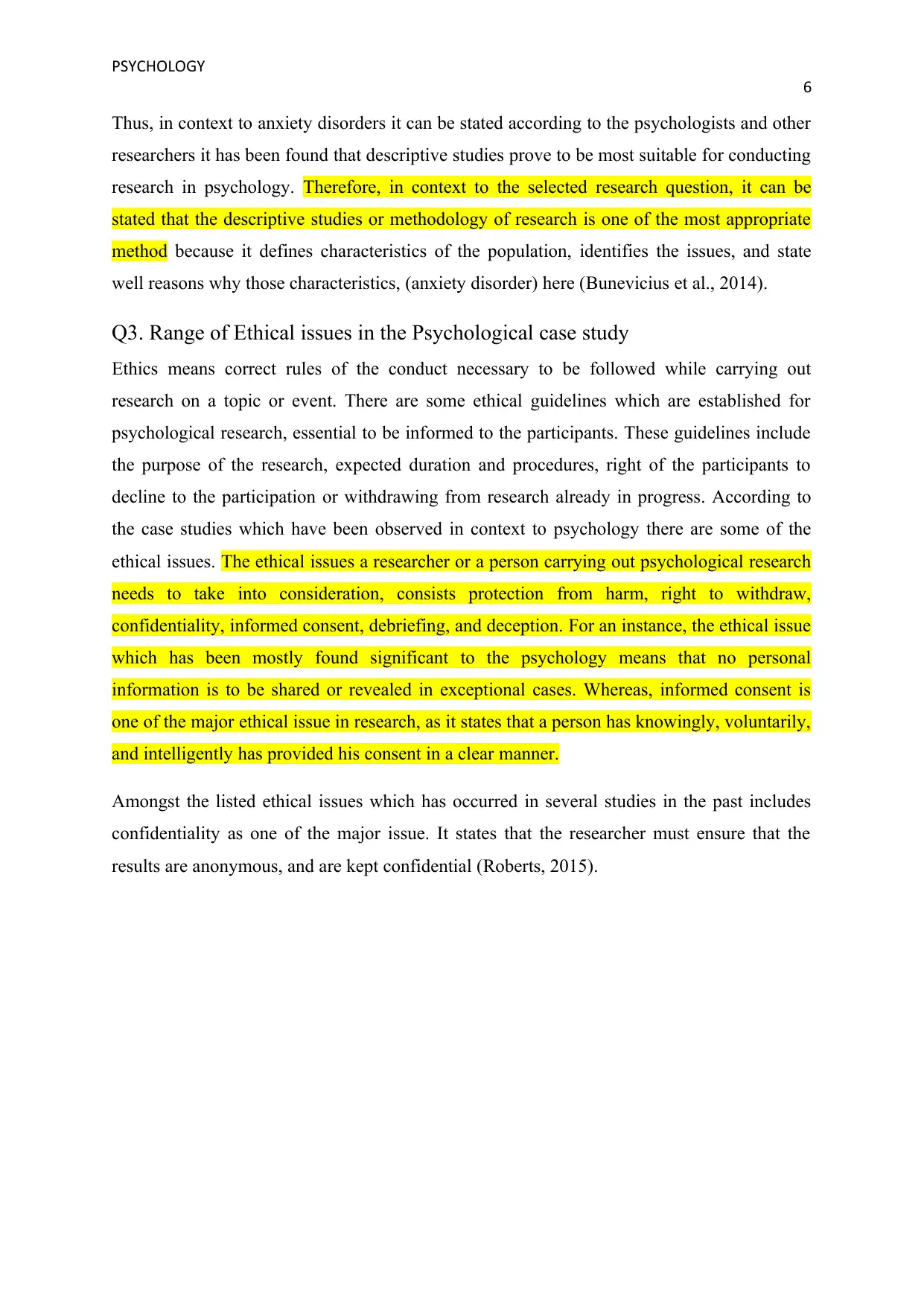
PSYCHOLOGY
6
Thus, in context to anxiety disorders it can be stated according to the psychologists and other
researchers it has been found that descriptive studies prove to be most suitable for conducting
research in psychology. Therefore, in context to the selected research question, it can be
stated that the descriptive studies or methodology of research is one of the most appropriate
method because it defines characteristics of the population, identifies the issues, and state
well reasons why those characteristics, (anxiety disorder) here (Bunevicius et al., 2014).
Q3. Range of Ethical issues in the Psychological case study
Ethics means correct rules of the conduct necessary to be followed while carrying out
research on a topic or event. There are some ethical guidelines which are established for
psychological research, essential to be informed to the participants. These guidelines include
the purpose of the research, expected duration and procedures, right of the participants to
decline to the participation or withdrawing from research already in progress. According to
the case studies which have been observed in context to psychology there are some of the
ethical issues. The ethical issues a researcher or a person carrying out psychological research
needs to take into consideration, consists protection from harm, right to withdraw,
confidentiality, informed consent, debriefing, and deception. For an instance, the ethical issue
which has been mostly found significant to the psychology means that no personal
information is to be shared or revealed in exceptional cases. Whereas, informed consent is
one of the major ethical issue in research, as it states that a person has knowingly, voluntarily,
and intelligently has provided his consent in a clear manner.
Amongst the listed ethical issues which has occurred in several studies in the past includes
confidentiality as one of the major issue. It states that the researcher must ensure that the
results are anonymous, and are kept confidential (Roberts, 2015).
6
Thus, in context to anxiety disorders it can be stated according to the psychologists and other
researchers it has been found that descriptive studies prove to be most suitable for conducting
research in psychology. Therefore, in context to the selected research question, it can be
stated that the descriptive studies or methodology of research is one of the most appropriate
method because it defines characteristics of the population, identifies the issues, and state
well reasons why those characteristics, (anxiety disorder) here (Bunevicius et al., 2014).
Q3. Range of Ethical issues in the Psychological case study
Ethics means correct rules of the conduct necessary to be followed while carrying out
research on a topic or event. There are some ethical guidelines which are established for
psychological research, essential to be informed to the participants. These guidelines include
the purpose of the research, expected duration and procedures, right of the participants to
decline to the participation or withdrawing from research already in progress. According to
the case studies which have been observed in context to psychology there are some of the
ethical issues. The ethical issues a researcher or a person carrying out psychological research
needs to take into consideration, consists protection from harm, right to withdraw,
confidentiality, informed consent, debriefing, and deception. For an instance, the ethical issue
which has been mostly found significant to the psychology means that no personal
information is to be shared or revealed in exceptional cases. Whereas, informed consent is
one of the major ethical issue in research, as it states that a person has knowingly, voluntarily,
and intelligently has provided his consent in a clear manner.
Amongst the listed ethical issues which has occurred in several studies in the past includes
confidentiality as one of the major issue. It states that the researcher must ensure that the
results are anonymous, and are kept confidential (Roberts, 2015).
Paraphrase This Document
Need a fresh take? Get an instant paraphrase of this document with our AI Paraphraser
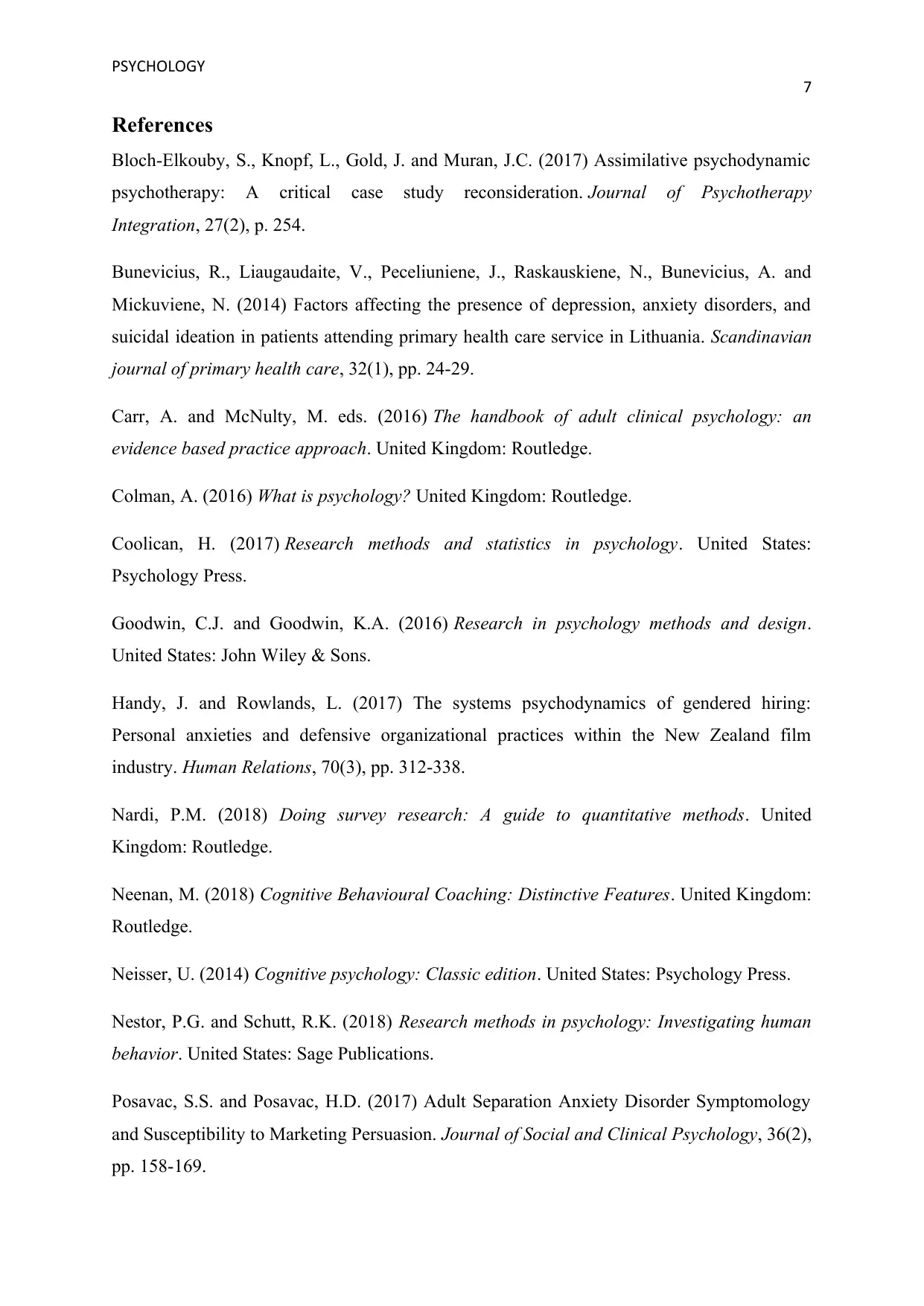
PSYCHOLOGY
7
References
Bloch-Elkouby, S., Knopf, L., Gold, J. and Muran, J.C. (2017) Assimilative psychodynamic
psychotherapy: A critical case study reconsideration. Journal of Psychotherapy
Integration, 27(2), p. 254.
Bunevicius, R., Liaugaudaite, V., Peceliuniene, J., Raskauskiene, N., Bunevicius, A. and
Mickuviene, N. (2014) Factors affecting the presence of depression, anxiety disorders, and
suicidal ideation in patients attending primary health care service in Lithuania. Scandinavian
journal of primary health care, 32(1), pp. 24-29.
Carr, A. and McNulty, M. eds. (2016) The handbook of adult clinical psychology: an
evidence based practice approach. United Kingdom: Routledge.
Colman, A. (2016) What is psychology? United Kingdom: Routledge.
Coolican, H. (2017) Research methods and statistics in psychology. United States:
Psychology Press.
Goodwin, C.J. and Goodwin, K.A. (2016) Research in psychology methods and design.
United States: John Wiley & Sons.
Handy, J. and Rowlands, L. (2017) The systems psychodynamics of gendered hiring:
Personal anxieties and defensive organizational practices within the New Zealand film
industry. Human Relations, 70(3), pp. 312-338.
Nardi, P.M. (2018) Doing survey research: A guide to quantitative methods. United
Kingdom: Routledge.
Neenan, M. (2018) Cognitive Behavioural Coaching: Distinctive Features. United Kingdom:
Routledge.
Neisser, U. (2014) Cognitive psychology: Classic edition. United States: Psychology Press.
Nestor, P.G. and Schutt, R.K. (2018) Research methods in psychology: Investigating human
behavior. United States: Sage Publications.
Posavac, S.S. and Posavac, H.D. (2017) Adult Separation Anxiety Disorder Symptomology
and Susceptibility to Marketing Persuasion. Journal of Social and Clinical Psychology, 36(2),
pp. 158-169.
7
References
Bloch-Elkouby, S., Knopf, L., Gold, J. and Muran, J.C. (2017) Assimilative psychodynamic
psychotherapy: A critical case study reconsideration. Journal of Psychotherapy
Integration, 27(2), p. 254.
Bunevicius, R., Liaugaudaite, V., Peceliuniene, J., Raskauskiene, N., Bunevicius, A. and
Mickuviene, N. (2014) Factors affecting the presence of depression, anxiety disorders, and
suicidal ideation in patients attending primary health care service in Lithuania. Scandinavian
journal of primary health care, 32(1), pp. 24-29.
Carr, A. and McNulty, M. eds. (2016) The handbook of adult clinical psychology: an
evidence based practice approach. United Kingdom: Routledge.
Colman, A. (2016) What is psychology? United Kingdom: Routledge.
Coolican, H. (2017) Research methods and statistics in psychology. United States:
Psychology Press.
Goodwin, C.J. and Goodwin, K.A. (2016) Research in psychology methods and design.
United States: John Wiley & Sons.
Handy, J. and Rowlands, L. (2017) The systems psychodynamics of gendered hiring:
Personal anxieties and defensive organizational practices within the New Zealand film
industry. Human Relations, 70(3), pp. 312-338.
Nardi, P.M. (2018) Doing survey research: A guide to quantitative methods. United
Kingdom: Routledge.
Neenan, M. (2018) Cognitive Behavioural Coaching: Distinctive Features. United Kingdom:
Routledge.
Neisser, U. (2014) Cognitive psychology: Classic edition. United States: Psychology Press.
Nestor, P.G. and Schutt, R.K. (2018) Research methods in psychology: Investigating human
behavior. United States: Sage Publications.
Posavac, S.S. and Posavac, H.D. (2017) Adult Separation Anxiety Disorder Symptomology
and Susceptibility to Marketing Persuasion. Journal of Social and Clinical Psychology, 36(2),
pp. 158-169.
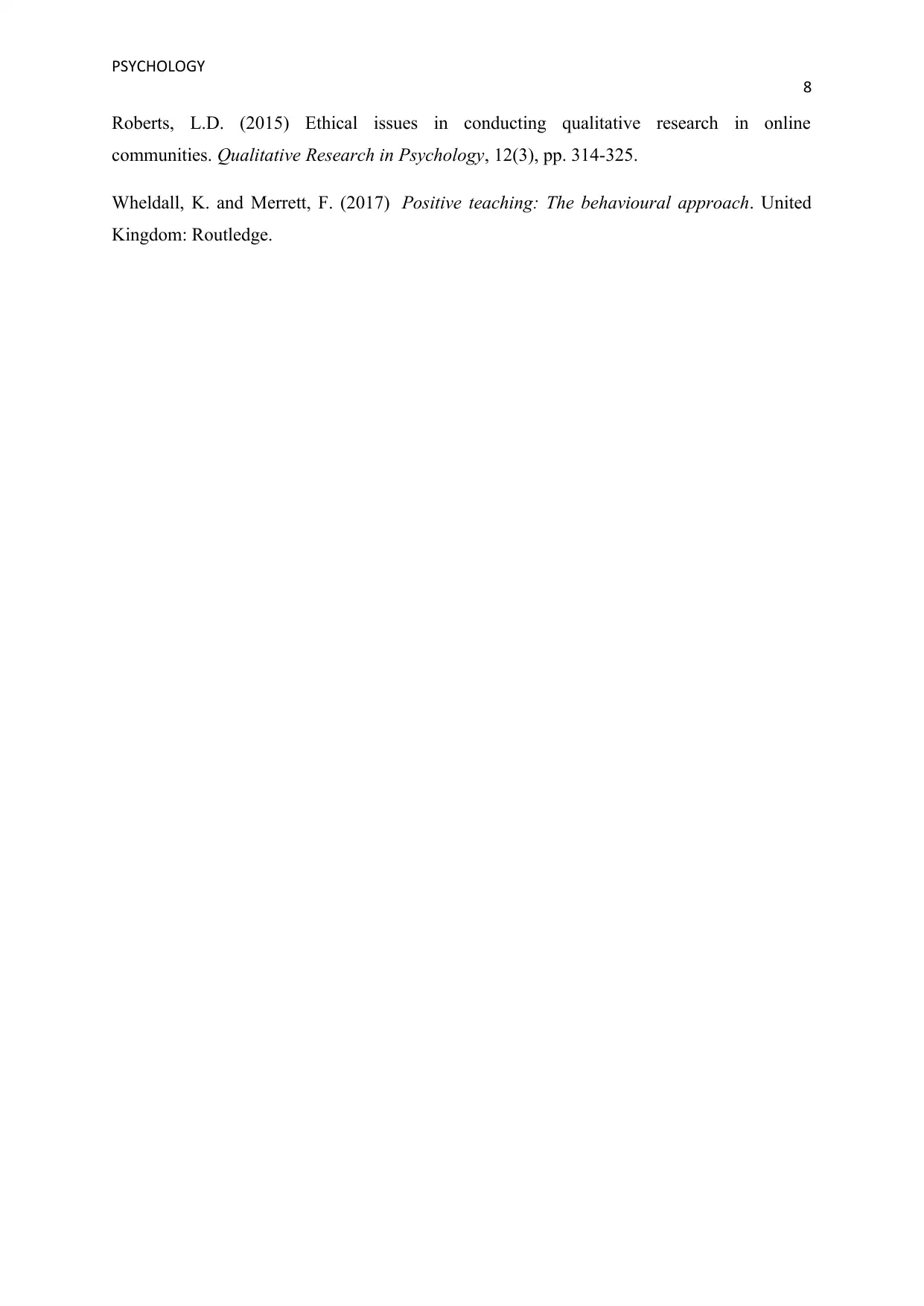
PSYCHOLOGY
8
Roberts, L.D. (2015) Ethical issues in conducting qualitative research in online
communities. Qualitative Research in Psychology, 12(3), pp. 314-325.
Wheldall, K. and Merrett, F. (2017) Positive teaching: The behavioural approach. United
Kingdom: Routledge.
8
Roberts, L.D. (2015) Ethical issues in conducting qualitative research in online
communities. Qualitative Research in Psychology, 12(3), pp. 314-325.
Wheldall, K. and Merrett, F. (2017) Positive teaching: The behavioural approach. United
Kingdom: Routledge.
⊘ This is a preview!⊘
Do you want full access?
Subscribe today to unlock all pages.

Trusted by 1+ million students worldwide
1 out of 9
Related Documents
Your All-in-One AI-Powered Toolkit for Academic Success.
+13062052269
info@desklib.com
Available 24*7 on WhatsApp / Email
![[object Object]](/_next/static/media/star-bottom.7253800d.svg)
Unlock your academic potential
Copyright © 2020–2026 A2Z Services. All Rights Reserved. Developed and managed by ZUCOL.




